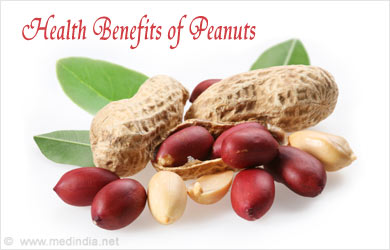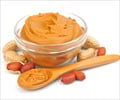- Peanuts - (http://www.whfoods.com/genpage.php?tname=foodspice&dbid=101)
- Peanuts nutrition facts - (http://www.nutrition-and-you.com/peanuts.html)
- Peanuts (Groundnut, Arachis Hypogaea): Benefits, Side Effects and Nutrition Facts - (http://www.seedguides.info/peanuts/)
- Peanuts, all types, raw - (nutrition-data/peanuts-all-types-raw.htm)
What are the Health Benefits of Peanuts?
Peanuts, also known as groundnuts, belong to the legume family and are actually not nuts. This nutty-flavored legume grows underground. The pods from the peanut plant burrow into the ground, where they mature and are dug out upon maturation.
Eating peanuts is good for the health and knowing the nutritional facts about peanuts can help you determine how and in what quantity to include this healthy legume in your diet. When including peanuts in your diet, it is important to be mindful of the calories in peanuts. Or else, the high cholesterol value and the high calories can negate its many health benefits.

Health Benefits of Peanuts
Peanuts are a good source of many important nutrients needed by our body every day. Eating peanuts on a regular basis can offer many health benefits. Eat peanuts in moderate quantities to get the maximum benefit from this delicious food.
- Peanuts are good for the health of the heart. This is because peanuts are full of monounsaturated fats, particularly oleic acid. These healthy fats reduce the LDL levels in the blood, thereby helping the heart.

- Peanuts are a good source of niacin, which helps prevent age-related health problems, such as Alzheimer’s disease and other cognitive problems.
- Eating peanuts can provide a healthy dose of protein and can fulfill the daily requirement of essential amino acids.
- Peanuts are rich in antioxidants, such as resveratrol and p-coumaric acid. The former is beneficial against heart problems, viral infections, cancers, and degenerative diseases, while the latter is known to reduce the risk of stomach cancer. Therefore, peanuts must be a part of a balanced diet.
- Resveratrol is also known to lower the risk of stroke. It keeps the blood vessels healthy and stimulates the nitric oxide production in the body. Both these functions help reduce the instances of stroke.

- Eating peanuts can provide a good amount of vitamin E, which is a powerful antioxidant. It is a fat-soluble vitamin and protects the skin from free radical damage, and is also useful in cell membrane maintenance.
- Peanuts are a good source of dietary fiber. Eating peanuts can fill you up well and reduce hunger pangs and even cravings. This helps in weight loss and weight management.
- Peanuts also contain a good amount of vitamin C, which helps in collagen production and is useful in maintaining skin health.

- Peanuts are rich in phosphorus, which strengthens the bones and promotes cell growth.
- Peanuts are a good source of folate, which is needed by pregnant women to ensure good cell and nerve growth in fetuses.
- Peanuts provide a good amount of copper, which is needed for the good health of nerves, bones, and red blood cells.
- Eating peanuts can give you lots of magnesium that is required by the body for muscle functions and energy production.
- The health benefits of red skin peanuts are abundant. The peanut skin contains good quantities of antioxidants and good monounsaturated fats. These antioxidants, such as resveratrol, are good for the skin, heart, and nerve health.

Peanut Recipes
Eating peanuts is very easy. You can simply toss a few roasted peanuts in your mouth when busy at work or with chores. Peanuts can also be easily prepared as tasty dishes with some simple recipes.
Peanut Salad
This is an extremely healthy recipe that can be consumed as a pre-lunch snack or to satisfy those mid-evening hunger pangs.
Soak a fistful of raw peanuts overnight. Drain and store them wrapped in muslin cloth or in a bowl covered with a dish. Once the legume sprouts are well-formed, mix them with chick pea sprouts or green gram (green mung) sprouts. Add chopped tomatoes, grated carrot and fresh coriander leaves. Season it with salt and lemon juice. Your healthy peanut salad is ready.
Peanut and Tomato Chutney
Blanch two tomatoes and make a paste with green chilies. Roast and grind a cup of peanuts. In a pan heat peanut oil and add mustard seeds and remove from heat when the seeds begin to splatter. Add fresh curry leaves and then add the tomato-chili paste. Cook for a few minutes and add peanuts. Keep the heat on for a few minutes and the healthy peanut chutney is ready. Savor it with hot rice or bread or use it as a sandwich spread.
Mint and Peanut Roast Mix
Roast peanuts. When roasted, add a teaspoon of olive oil in the pan. Mix well. Add salt, black pepper powder, and dry mint leaves. This makes for a healthy snack to munch during office hours or while watching an after-dinner movie.
Peanut Rice
Cook rice and set aside. In a pan, heat oil and add mustard seeds, curry leaves, and sesame seeds. Remove from the heat when seeds splatter. Add roasted peanuts. You can also add almonds and cashew along with the peanuts. Add thinly-sliced potatoes and cook them well. Add tiny pieces of cottage cheese and let them cook for a minute. Now add salt, red chili powder, turmeric powder, black pepper powder and chopped green chilies. Mix everything well. Add rice and mix it all again. Garnish with fresh coriander leaves and relish it with fresh coconut chutney.

Some ways to include Healthy Peanuts in your everyday Diet:
- Add roasted peanut powder in your coconut chutney.
- Add roasted peanuts in your snack dishes.
- Eat roasted peanuts fresh out of shells with jaggery during chilly winter days.
- Use peanut and sesame chutney in lieu of other salt-rich and store-bought sauces.
- Add peanut flour to the baking dough mix and make healthy cookies and cakes.








